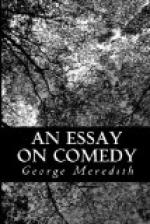they will laugh at, and the ring of the laugh; but
we know likewise that the larger natures are distinguished
by the great breadth of their power of laughter, and
no one really loving Moliere is refined by that love
to despise or be dense to Aristophanes, though it
may be that the lover of Aristophanes will not have
risen to the height of Moliere. Embrace them
both, and you have the whole scale of laughter in your
breast. Nothing in the world surpasses in stormy
fun the scene in The Frogs, when Bacchus and Xanthias
receive their thrashings from the hands of businesslike
OEacus, to discover which is the divinity of the two,
by his imperviousness to the mortal condition of pain,
and each, under the obligation of not crying out,
makes believe that his horrible bellow—the
god’s
iou iou being the lustier—means
only the stopping of a sneeze, or horseman sighted,
or the prelude to an invocation to some deity:
and the slave contrives that the god shall get the
bigger lot of blows. Passages of Rabelais, one
or two in Don Quixote, and the Supper in the Manner
of the Ancients, in Peregrine Pickle, are of a similar
cataract of laughter. But it is not illuminating;
it is not the laughter of the mind. Moliere’s
laughter, in his purest comedies, is ethereal, as light
to our nature, as colour to our thoughts. The
Misanthrope and the Tartuffe have no audible laughter;
but the characters are steeped in the comic spirit.
They quicken the mind through laughter, from coming
out of the mind; and the mind accepts them because
they are clear interpretations of certain chapters
of the Book lying open before us all. Between
these two stand Shakespeare and Cervantes, with the
richer laugh of heart and mind in one; with much of
the Aristophanic robustness, something of Moliere’s
delicacy.
* * * * *
The laughter heard in circles not pervaded by the
Comic idea, will sound harsh and soulless, like versified
prose, if you step into them with a sense of the distinction.
You will fancy you have changed your habitation to
a planet remoter from the sun. You may be among
powerful brains too. You will not find poets—or
but a stray one, over-worshipped. You will find
learned men undoubtedly, professors, reputed philosophers,
and illustrious dilettanti. They have in them,
perhaps, every element composing light, except the
Comic. They read verse, they discourse of art;
but their eminent faculties are not under that vigilant
sense of a collective supervision, spiritual and present,
which we have taken note of. They build a temple
of arrogance; they speak much in the voice of oracles;
their hilarity, if it does not dip in grossness, is
usually a form of pugnacity.
Insufficiency of sight in the eye looking outward
has deprived them of the eye that should look inward.
They have never weighed themselves in the delicate
balance of the Comic idea so as to obtain a suspicion
of the rights and dues of the world; and they have,
in consequence, an irritable personality. A
very learned English professor crushed an argument
in a political discussion, by asking his adversary
angrily: ’Are you aware, sir, that I am
a philologer?’




